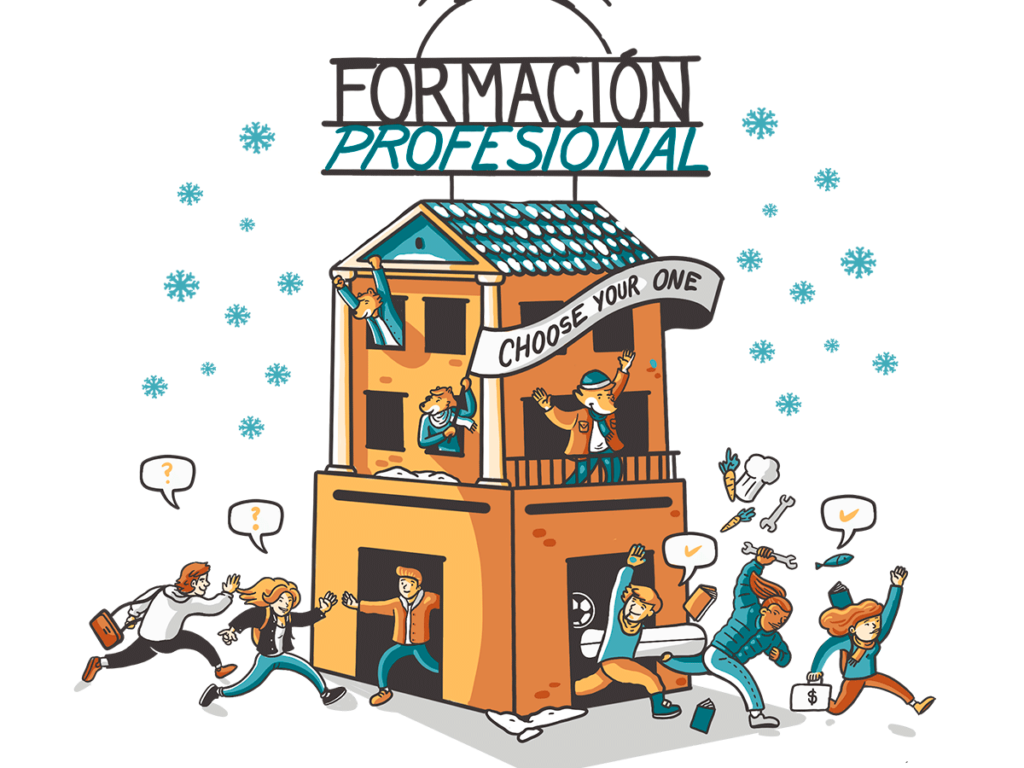Nowadays, vocational training and higher grades offer a number of technical advantages and skills development opportunities that can make a difference in the world of work.
We welcome you to the IBP Barcelona Blog, and in this article, we will introduce you to the advantages of professional training, advanced degrees and skills that can be developed through these educational programs.
Introduction
We are in an increasingly competitive and constantly evolving world, vocational training and higher degrees have become very relevant educational options, making a direct competition to university studies.
Vocational training programmes offer practical and specialized education, giving students a significant advantage in the labour market through the development of practical skills over theoretical ones.

Technical advantages of vocational training
Acquisition of practical skills
One of the main advantages of vocational training is the acquisition of practical skills.
Unlike traditional education, which focuses on theory, vocational training focuses on the practical application of knowledge.
Students learn technical skills directly related to their area of study, allowing them to be prepared to face the challenges of the working world more effectively.
We all know that practice makes the teacher in any aspect!
Focus on work experience
Another notable advantage of higher grades is the focus on work experience to apply the practical skills being developed.
Vocational training programmes often include compulsory or recommended professional placements in recognised companies with a professional background, giving students the opportunity to apply their knowledge in real working environments.
This practical experience is highly valued and demanded by employers, as it demonstrates the ability of the student to face real situations and solve problems effectively.
Updating of technical knowledge
Vocational training also offers the possibility of keeping up-to-date in terms of technical knowledge.
Many of the programs, such as Advertising and Marketing, Administration and Finance or International Trade are designed taking into account the latest trends and developments in each specific field.
Students have access to up-to-date information and learn useful techniques and tools in high demand in the labour market.
These techniques give them a competitive advantage when looking for jobs and allow them to stay relevant in their field over time.
Specialization in a specific area
Taking a higher education course allows specialization in a specific area.
Students have the opportunity to choose programs that suit their particular interests and abilities.
By focusing on a specific field, they can develop highly specialized skills and become experts in their area of study.
Specialization can open doors to exciting and well-paid job opportunities as today’s skills are of great value.
Higher grades as an educational option
Higher grades are an additional educational option that offers significant technical advantages.
These programmes are located in vocational training prior to university education, offering a higher level of specialization and preparation for the world of work.
Higher level of specialisation
One of the main advantages of higher grades is the higher level of expertise they can offer.
These programs focus on specific areas and deepen the technical knowledge needed to perform in that field.
This enables students to become highly trained and sought after professionals in the labor market.
Access to skilled jobs
Graduates of higher education have access to skilled jobs requiring an advanced level of technical knowledge.
Educational programmes were designed to meet the needs of the labour market, and employers valued candidates who had completed a higher grade.
It thus expands employment opportunities and enables graduates to access high-paying and quality jobs.
Possibility of continuing university studies
Another advantage of higher grades is that they offer the possibility of continuing with university studies.
Upon completion of a higher degree, students can obtain a degree that allows them to access university programs related to their area of specialization.
This allows them to continue expanding their knowledge and advancing their academic career if they wish.
Skills developed in vocational training
In addition to the technical advantages, vocational training and higher degrees allow the development of a variety of skills that are highly valued in the working environment.
Specific technical skills
Vocational training and higher grades provide students with specific technical skills that are relevant to their field of study and professional branch.
These skills may include mastery of specific tools and technologies, ability to perform specialized tasks, and in-depth understanding of key concepts in your area of expertise.
Teamwork skills
Professional training encourages the development of teamwork skills.
Students often work on group projects and collaborate with peers to achieve common goals.
Thus, learning to communicate effectively, resolve conflicts and leverage individual strengths to achieve collective results.
These skills are essential in the work environment, where effective collaboration is critical to success.
Communication and negotiation skills
Professional training also helps develop communication and negotiation skills.
Students learn to express themselves clearly and effectively, both verbally and in writing.
They also acquire negotiation skills that enable them to resolve disputes, reach agreements and find solutions that benefit all parties involved.
These are valuable skills in any work environment, where effective communication and the ability to resolve conflicts constructively are essential.
Problem solving skills
Professional training encourages the development of problem-solving and decision-making skills.
Students learn to face challenges and find practical and efficient solutions.
Through case studies, projects and learning situations based on real problems, students acquire the ability to analyze situations, identify obstacles and find innovative solutions.
Effective problem solving is essential to the progress and success of any institution, so these skills are highly valued in the work environment.
The importance of internships
Traineeships play a key role in vocational training and higher education.
These practical experiences offer a number of significant benefits for students.
Practical experience in the working environment
Internships provide students with valuable practical experience in the workplace.
They allow students to apply the knowledge and skills acquired during their training in real work situations.
This helps them become familiar with the work environment, work dynamics and professional responsibilities.
It also gives them the opportunity to face real challenges and learn from experienced professionals.
They can also choose according to their degree of integration, to stay to work in the company or organization where they carried out these professional practices.
Opportunity to apply theoretical knowledge
Internships allow students to apply the theoretical knowledge acquired during their training in practical situations.
This helps them understand how concepts are applied in the real world and how to solve concrete problems in their field of study.
Practical experience allows them to connect theory with practice, strengthening their understanding and professional skills.
Direct contact with industry professionals
During the internship, students have the opportunity to interact and learn from industry professionals.
Direct contact gives them an invaluable perspective on the reality of work in their field of study.
They can learn from the experience and advice of established professionals, establish contacts that may be useful in the future and gain a deeper understanding of the expectations and demands of the work environment.
In conclusion
Vocational training and higher degrees offer a number of technical advantages and skills development opportunities that are highly valued in the world of work.
These educational programs provide students with practical knowledge, specific technical skills and the ability to specialize in a given area.
In addition, internships complement theoretical training with practical experience in the real working environment.
By considering these educational options, students can acquire a significant advantage in the labor market and be better prepared to face professional challenges.
For more information on higher education and vocational training, please visit our website at the following link.




